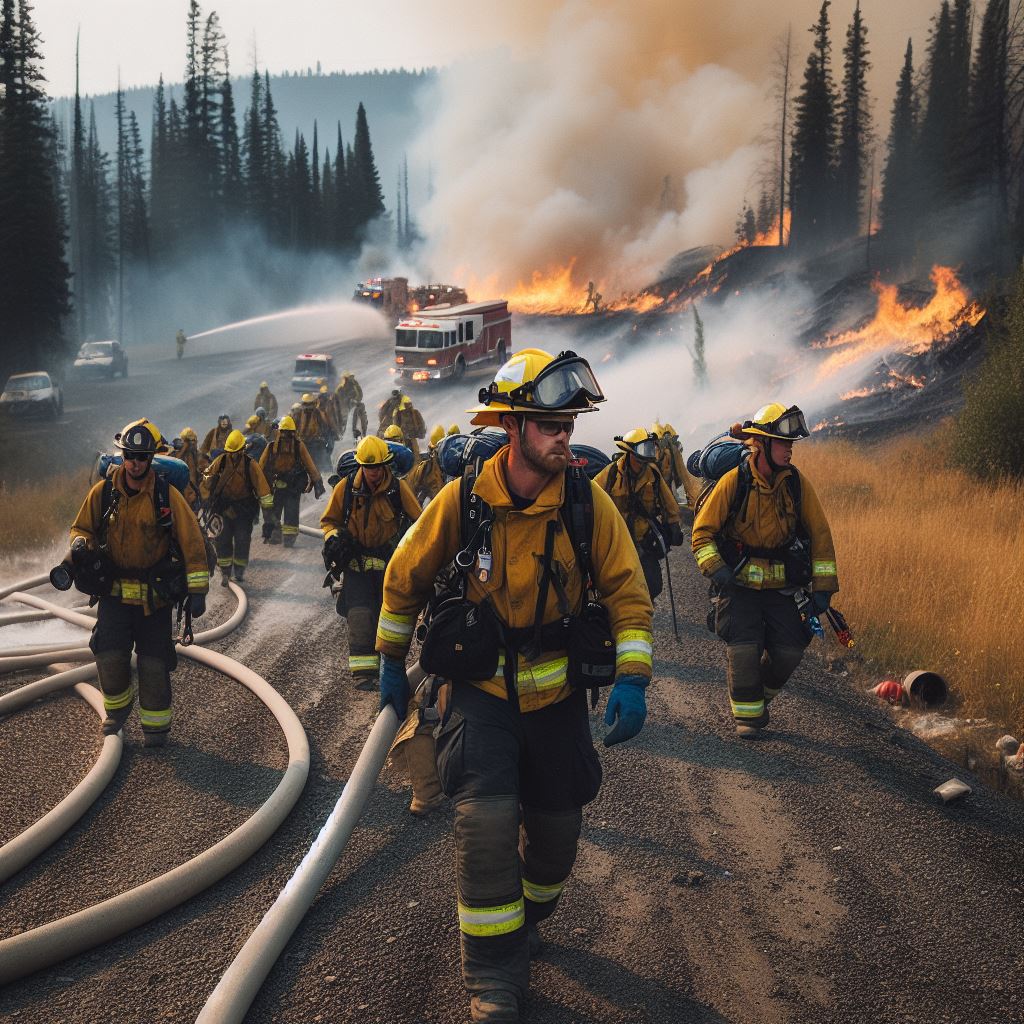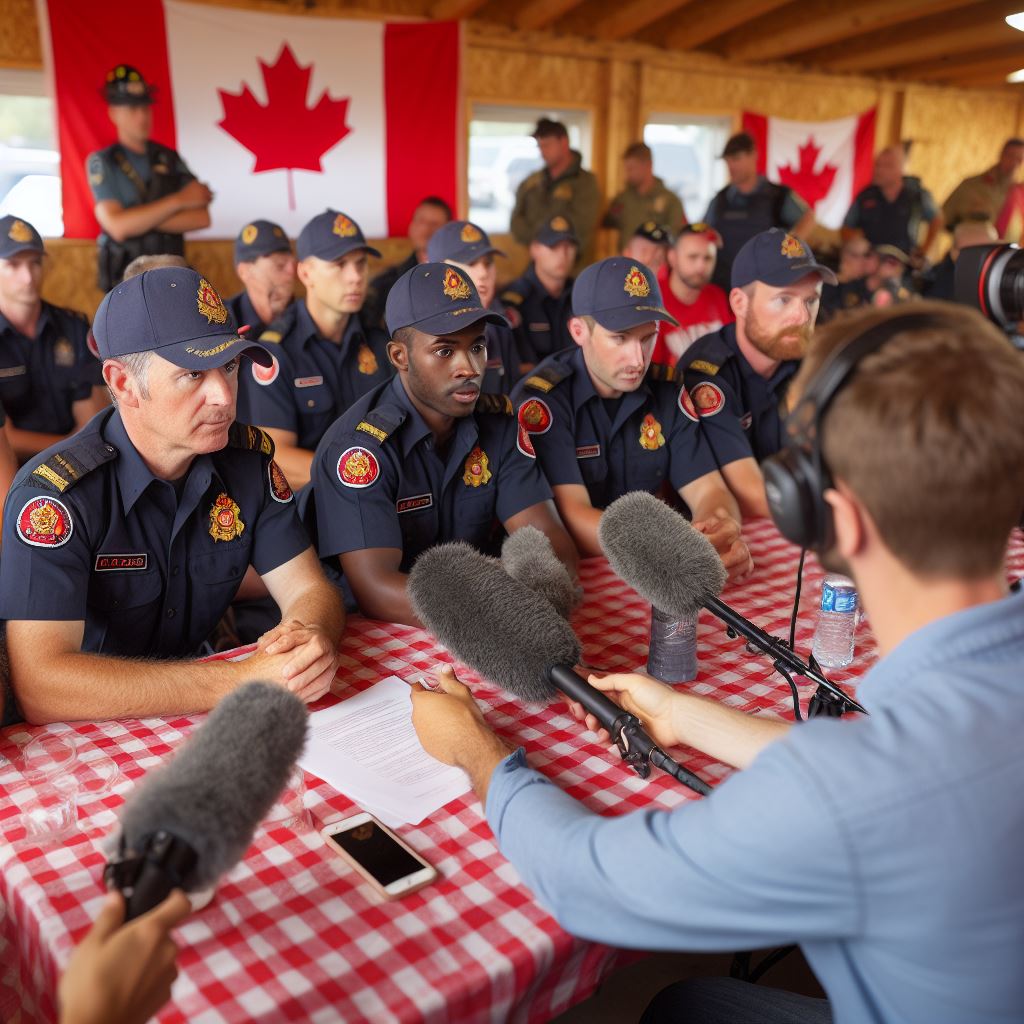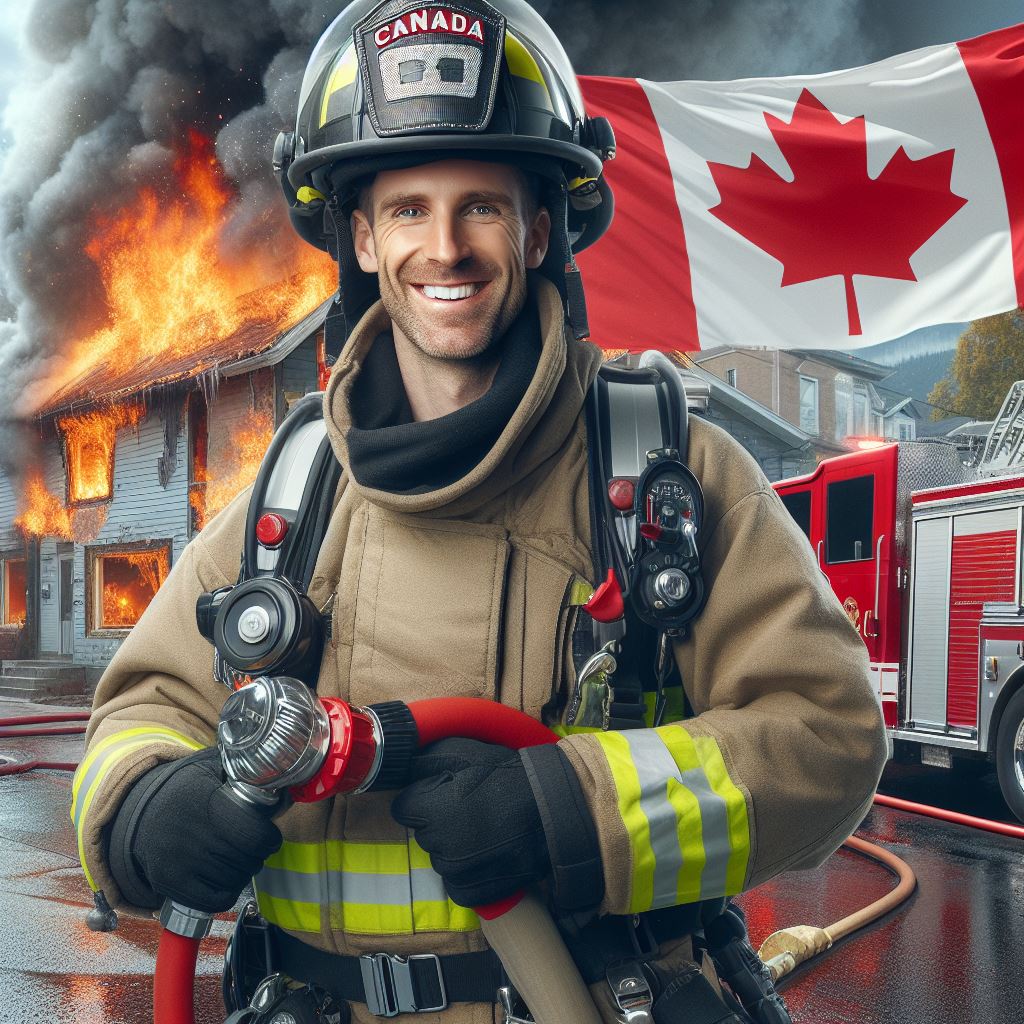Introduction
Volunteer firefighting plays a crucial role in ensuring the safety and well-being of rural communities in Canada.
In these regions, where professional fire services may not be readily available, volunteers step up to protect their neighbors and property from fire emergencies.
Definition of volunteer firefighting
Volunteer firefighting refers to the act of individuals who willingly dedicate their time, skills, and resources to combat fires and assist in emergency situations without financial compensation.
They undergo training to handle fire-related incidents and support their community.
Explanation of rural Canada and its unique challenges
Rural Canada encompasses vast areas with low population densities, limited infrastructure, and extensive natural landscapes.
These remote regions face distinctive challenges such as longer response times, lack of water sources, and distance from medical facilities, making fire incidents more perilous.
Importance of volunteer firefighting in rural communities
Volunteer firefighting is vital for rural communities as it provides a rapid response to mitigate fire emergencies.
Their presence ensures early intervention, preventing the escalation of fires and minimizing property damage.
Moreover, they offer invaluable support to professional services during large-scale incidents, augmenting their capabilities.
Volunteer firefighters also contribute to community resilience by organizing fire prevention campaigns, offering safety education, and promoting preparedness.
Their selfless dedication and willingness to put themselves in harm’s way make them the backbone of fire protection in rural Canada.
Without their service, the safety of these communities would be severely compromised.
Basically, volunteer firefighting in rural Canada is of utmost importance due to the unique challenges faced by these communities.
The commitment and sacrifice of these volunteers are crucial in safeguarding lives, properties, and promoting a culture of fire safety.
Their invaluable service embodies the spirit of community support and resilience in the face of adversity.
Role and Responsibilities of Volunteer Firefighters
Volunteer firefighters play a vital role in ensuring the safety and well-being of rural communities in Canada.
Their commitment and dedication to protecting lives and property are commendable. Let’s explore the various responsibilities they undertake:
Emergency response and fire suppression
- Volunteer firefighters are the first responders to emergency calls, providing immediate assistance to those in need.
- They are trained to combat and extinguish fires, working tirelessly to ensure the safety of both residents and their surroundings.
- Using specialized firefighting equipment, they strive to contain and minimize the damage caused by fires.
- By putting their lives at risk, they selflessly protect their community from potential disasters.
Search and rescue operations
- Volunteer firefighters frequently assist in search and rescue efforts, locating missing individuals and saving lives.
- They undergo rigorous training to handle complex situations, such as rescuing individuals trapped in dangerous or hard-to-reach locations.
- Their knowledge of the local area helps them navigate through rough terrain during search and rescue operations.
- By working in collaboration with other emergency service providers, they ensure a swift and coordinated response in critical situations.
Medical assistance and first aid
- Volunteer firefighters are often the first to arrive at the scene of medical emergencies.
- They are trained in basic first aid and CPR techniques, providing immediate care and stabilizing patients until medical professionals arrive.
- Their quick response can be life-saving, particularly in situations where every second counts.
- Volunteer firefighters are crucial in delivering essential medical assistance to rural communities with limited access to healthcare services.
Community education and fire prevention programs
- Volunteer firefighters play an essential role in educating the community about fire safety measures and prevention techniques.
- They organize and participate in various community awareness programs, aiming to reduce the number of fire incidents.
- By conducting fire drills and distributing educational materials, they empower residents to adopt proactive fire safety practices.
- Volunteer firefighters are instrumental in building a resilient and fire-safe community through their outreach efforts.
Equipment maintenance and training
- Volunteer firefighters ensure that all firefighting equipment is well-maintained and in optimal working condition.
- They regularly inspect and service fire trucks, hoses, and other essential tools to ensure their reliability during emergencies.
- Continuous training is a priority for volunteer firefighters, allowing them to enhance their skills and stay updated on the latest firefighting techniques.
- They attend workshops, drills, and exercises, honing their abilities to face diverse emergency scenarios.
In essence, volunteer firefighters in rural Canada undertake multifaceted responsibilities that go beyond extinguishing fires.
These selfless individuals serve as the backbone of their communities, dedicating their time and effort to protect and educate their fellow residents.
Their commitment and bravery deserve our utmost respect and support.
Read: Day in the Life of a Canadian Firefighter
Challenges Faced by Volunteer Firefighters in Rural Canada
Limited resources and funding
- Volunteer firefighters in rural Canada often face challenges due to limited resources.
- Due to financial constraints, fire departments in rural areas struggle to acquire necessary equipment.
- Outdated or insufficient equipment hampers the effectiveness of emergency response efforts.
- Limited funding also impacts the maintenance and upkeep of fire stations and vehicles.
- Relying heavily on donations and fundraisers, volunteer firefighters constantly have to seek financial support.
Lack of accessibility to advanced training
- Rural volunteer firefighters often lack access to advanced and specialized training programs.
- Due to the geographic isolation of rural communities, training opportunities are limited.
- Advanced firefighting techniques and technologies may not be available in nearby training centers.
- This lack of accessibility hinders skill development, reducing the efficiency of firefighting operations.
- Volunteer firefighters must rely on experience and basic training, limiting their capabilities.
Longer response times and distances
- Volunteer firefighters in rural areas face the challenge of longer response times.
- Due to the larger territory they cover, distance becomes a major factor in emergency response.
- Long travel times to reach the scene of an incident can result in delayed assistance.
- Remote locations and difficult terrain can further increase response times.
- Firefighters must be prepared to deal with emergencies efficiently despite these geographical challenges.
Impact on personal and professional lives
- Being a volunteer firefighter in rural Canada often takes a toll on personal and professional lives.
- Emergency calls can occur at any time, disrupting daily routines and family commitments.
- Volunteers may have to leave their jobs, causing financial instability and career setbacks.
- Striking a balance between firefighting responsibilities and personal life becomes incredibly challenging.
- Volunteers must manage their time effectively and sacrifice personal convenience for the greater good.
Emotional toll and psychological support
- Dealing with intense situations and witnessing traumatic events can have a significant emotional toll on volunteer firefighters.
- Post-traumatic stress disorder (PTSD) is a serious concern within the firefighting community.
- Rural volunteer firefighters often lack access to sufficient psychological support services.
- These brave individuals often shoulder the emotional burden themselves, leading to burnout and mental health issues.
- Efforts should be made to prioritize mental health support and provide resources to cope with the challenges they face.
Essentially, volunteer firefighters in rural Canada face numerous challenges that greatly impact their ability to provide effective emergency response.
Limited resources and funding, lack of access to advanced training, longer response times and distances, impact on personal and professional lives, and the emotional toll they experience are all significant hurdles.
It is crucial for communities and government entities to recognize these challenges and work towards providing the necessary support and resources to overcome them.
Read: Fitness Tips for Aspiring Firefighters
Unlock Your Career Potential
Visualize a clear path to success with our tailored Career Consulting service. Personalized insights in just 1-3 days.
Get Started
Benefits of Volunteer Firefighting in Rural Canada
Volunteer firefighting in rural Canada brings numerous benefits to individuals who choose to dedicate their time and effort to this important cause.
Let’s explore the advantages in detail:
Sense of community and belonging
One of the primary benefits of volunteer firefighting is the sense of community and belonging it fosters.
By actively participating in their local fire department, volunteers forge strong connections with the community they are serving.
They become an integral part of the town or region, developing relationships with fellow firefighters, community leaders, and residents.
This sense of belonging provides a strong support network and a feeling of pride in contributing to the safety and well-being of their neighbors.
Enhanced leadership and teamwork skills
Volunteer firefighting is a demanding endeavor that requires individuals to work closely as a team in high-pressure situations.
This setting provides the perfect opportunity for volunteers to develop and enhance their leadership and teamwork skills.
Under the guidance of experienced firefighters, volunteers learn to communicate effectively, make quick decisions, and coordinate their efforts to tackle emergencies.
These invaluable skills can be applied not only in firefighting but also in various personal and professional settings.
Personal and professional growth opportunities
Engaging in volunteer firefighting opens doors to personal and professional growth.
Apart from gaining practical firefighting experience, volunteers often receive specialized training in areas such as first aid, emergency response, and hazardous materials handling.
These skills can be transferred to other fields, making volunteers more marketable and enhancing their resumes.
Furthermore, the knowledge and experience gained from volunteer firefighting help individuals become more self-confident, adaptable, and resilient, benefiting their personal growth and overall well-roundedness.
Contribution to public safety and saving lives
By volunteering as firefighters, individuals directly contribute to public safety and have the potential to save lives.
Rural areas often face challenges due to limited firefighting resources and longer response times. Volunteer firefighters help bridge this gap by being readily available within their communities.
They are the first line of defense in emergencies, providing immediate assistance until professional firefighters arrive.
Their dedication and bravery in tackling fires, rescuing trapped individuals, and providing vital emergency care make a significant difference in minimizing damage and ensuring the safety of all residents.
Increased respect and admiration from the community
Volunteer firefighters are highly regarded and deeply respected in their communities.
Their selfless commitment and willingness to put themselves in harm’s way to protect others garner immense admiration from fellow community members.
The unique combination of bravery, compassion, and sacrifice displayed by volunteer firefighters earns them the gratitude and respect of their neighbors.
This recognition further strengthens the sense of belonging within the community and motivates others to get involved in similar acts of service.
Generally, volunteer firefighting in rural Canada offers numerous benefits that extend beyond the immediate impact of saving lives and ensuring public safety.
It provides individuals with a sense of community, enhances their leadership and teamwork skills, opens doors to personal and professional growth, and earns them the respect and admiration of the community.
By choosing to volunteer as firefighters, individuals contribute not only to the physical safety of their neighbors but also to the overall well-being of their communities.
Read: How to Become a Firefighter in Canada
Delve into the Subject: Historic Fires and Lessons Learned
How to Get Involved in Volunteer Firefighting in Rural Canada
Volunteer firefighting in rural Canada is an important and rewarding way to serve your community.
If you are interested in becoming a volunteer firefighter, here are some steps you can take to get involved.
1. Contact the local volunteer fire department
The first step in becoming a volunteer firefighter is to reach out to your local fire department.
They will provide you with information on how to get started and what the requirements are.
2. Attend community meetings and information sessions
Community meetings and information sessions are a great way to learn more about volunteer firefighting and the role it plays in rural areas of Canada.
These events will also allow you to connect with other firefighters and hear their experiences firsthand.
3. Obtain required certifications and training
To become a volunteer firefighter, you will need to obtain certain certifications and complete training programs. These certifications may include first aid, CPR, and firefighting techniques.
The local fire department can provide you with information on where to obtain these certifications and training.
4. Physical fitness and preparation for the role
Volunteer firefighting requires physical fitness and the ability to handle stressful situations.
It is important to maintain a healthy lifestyle and engage in regular exercise to ensure you are physically prepared for the demands of the role.
5. Commitment and dedication to serve the community
Volunteer firefighting is not a commitment to be taken lightly. It requires a significant amount of time and dedication.
As a volunteer firefighter, you must be willing to respond to emergencies at any time and be prepared to put the needs of the community before your own.
In general, getting involved in volunteer firefighting in rural Canada is a noble and meaningful endeavor.
By contacting your local fire department, attending community meetings, obtaining necessary certifications, maintaining physical fitness, and demonstrating commitment, you can make a difference in your community and help keep it safe.
Read: Top Firefighting Schools Across Canada
Conclusion
Volunteer firefighting in rural Canada plays a crucial role in protecting communities. These dedicated individuals face unique challenges such as limited resources and long response times.
However, their selflessness and commitment are unwavering.
Considering the importance of volunteer firefighters, I encourage readers to contemplate volunteering in their own communities.
By joining forces, we can ensure the safety and well-being of our neighborhoods.
Volunteer firefighters deserve our utmost respect and admiration for their noble nature in risking their lives to save others.
They embody the true spirit of altruism, going above and beyond the call of duty. Their sacrifices should never go unnoticed, and we should offer our support whenever possible.
Let us recognize and appreciate the significant contributions volunteer firefighters make to rural Canada.
Their dedication is the backbone of fire services in these areas, safeguarding lives and property. Together, we can make a difference and continue to support the invaluable work of these heroic individuals.




